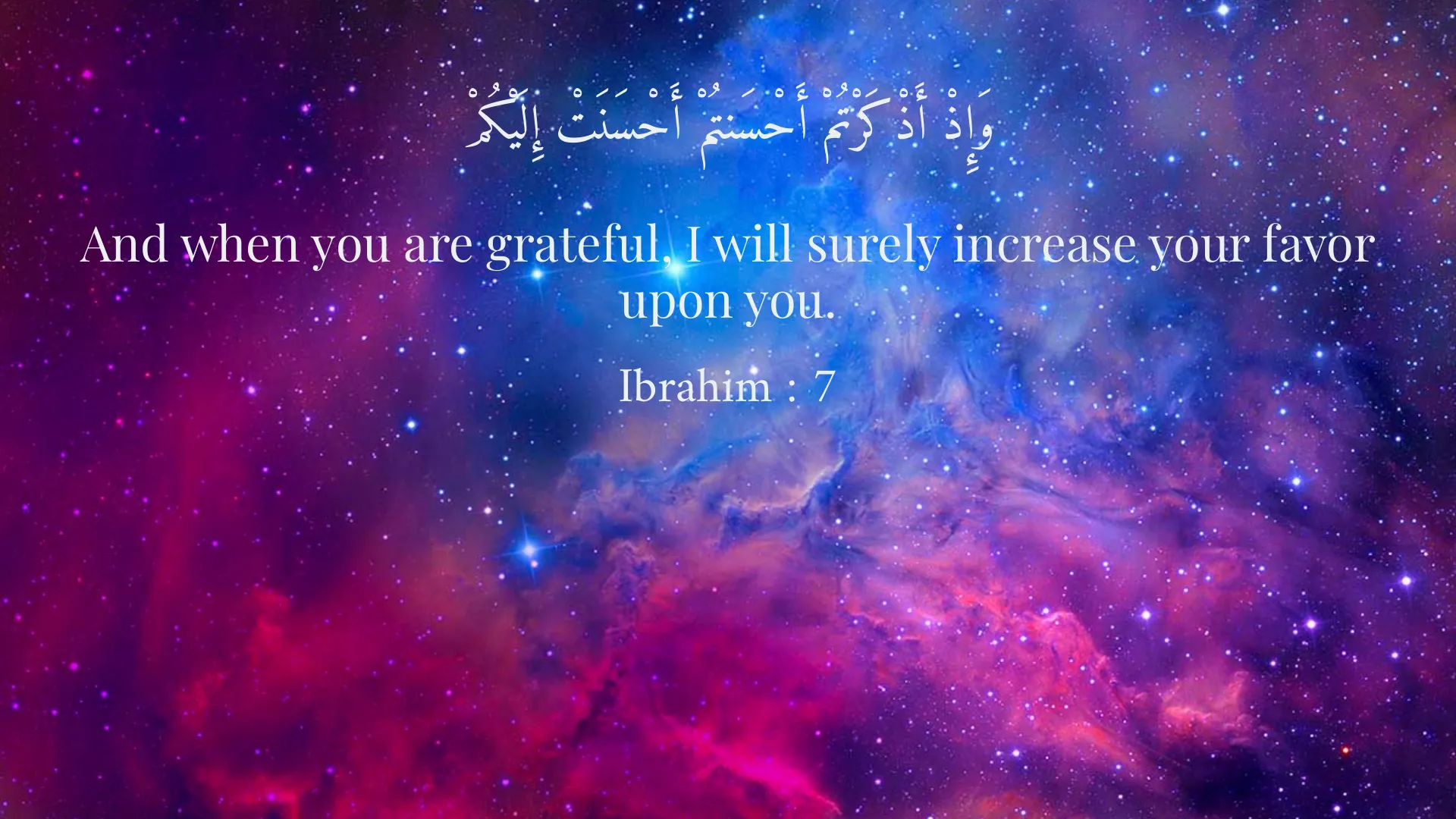Quranic Answer

The Quran, which is the holy book of Islam, serves as a comprehensive guide for humanity, providing principles for living a fulfilling and meaningful life. While it does not specifically pinpoint the importance of laughter and happiness, it heavily emphasizes being grateful for God's blessings and enjoying the gift of life. This perspective allows individuals to derive happiness from their day-to-day experiences and interactions. Throughout its verses, the Quran unveils profound teachings that underpin the significance of gratitude and joy in everyday existence. In Surah Ibrahim, verse 7, it is stated, 'And when you are grateful, I will surely increase your favor upon you.' This verse effectively encapsulates a fundamental principle concerning human interaction with the divine. The idea is straightforward: the act of gratitude is not merely a reaction to receiving blessings but a proactive engagement with the divine that invites further benevolence. It implies that acknowledgment of one's blessings catalyzes the bestowal of even more blessings, which serves as a motivating factor for individuals to embrace gratitude consciously. Laughter and happiness transcend mere transient emotional states; they are vital components of a healthy human life that contribute significantly to our interpersonal relationships. When individuals embody a joyful demeanor, they radiate positivity and engage with those around them more openly, fostering an environment conducive to mutual understanding and love. The effects of laughter can be seen in how it eases tensions, enhances mood, and often creates an atmosphere rich in camaraderie and goodwill. In many ways, laughter serves as a social glue, binding people together in shared experiences of joy. Moreover, there exists another verse within the Quran that addresses emotional well-being directly, stating, 'Unquestionably, by the remembrance of Allah hearts are assured.' This insightful verse highlights the importance of maintaining a tranquil heart filled with joy as a consequence of engaging in the remembrance of Allah. It reinforces the idea that spiritual practices, such as remembrance and gratitude, are linked closely to emotional states. By engaging with their spirituality, individuals are nurtured into feeling more secure, content, and happy. Beyond these specific verses, one can draw a broader perspective from the teachings of the Quran that encourages a life steeped in gratitude and joy. Living with gratitude not only enhances one's mood but also cultivates a positive outlook on life. This positivity allows individuals to navigate the various challenges and difficulties they may face more effectively and resiliently. When humans recognize the goodness in their lives—be it through family, health, friendship, or even the beauty of nature—they become more equipped to tackle adversities, resulting in a more fulfilling life. It is essential to understand that happiness is not merely the absence of sorrow but rather a state of being that encompasses contentment, joy, and overall well-being. The Quran encourages a balanced view of life where one acknowledges the ups and downs, continually returning to a state of gratitude. This process of returning to gratitude acts as a spiritual compass, guiding believers toward a more profound understanding of their purpose and the blessings they have received. To further underline the teachings surrounding gratitude and joy, Islamic traditions and hadiths provide additional insights. Many prophetic sayings illustrate the importance of joy and laughter. For instance, the Prophet Muhammad (peace be upon him) was known for his jovial nature; his laughter and smiles were seen as a beacon of light for those around him. He encouraged his followers to share joyful moments with each other, creating bonds of love that form a vital aspect of the community. Additionally, happiness can often be intertwined with the act of serving others. The Quran encourages believers to support those in need, and this act of altruism has been linked with increased happiness and life satisfaction. When individuals engage in helping others, whether through charity, kind words, or support, they often find joy in the act itself; it solidifies their own sense of community and belonging. In conclusion, while the Quran does not explicitly address the topics of laughter and happiness, it implicitly encourages a spirit of joy and gratitude woven throughout its verses. By fostering a lifestyle that embraces thankfulness for Allah's blessings and engaging in acts of remembrance, individuals can cultivate their emotional well-being and find fulfillment in their lives. The teachings of the Quran present a holistic view where happiness, when pursued through a grateful heart, can lead to a more meaningful existence. As individuals navigate through life, embracing both laughter and gratitude remains an essential component, enriching interpersonal relationships and contributing significantly to overall happiness. Through reflection upon these teachings, believers can forge a path toward a joyful and fulfilling life, highlighting the beauty found within the balance of life's experiences.
Related Verses
وَإِذْ أَذْكَرْتُمْ أَحْسَنتُمْ أَحْسَنَتْ إِلَيْكُمْ
And when you are grateful, I will surely increase your favor upon you.
Ibrahim : 7
أَلَا بِذِكْرِ اللَّهِ تَطْمَئِنُّ الْقُلُوبُ
Unquestionably, by the remembrance of Allah hearts are assured.
Ar-Ra'd : 28
Short Story
Once upon a time, there was a man named Hamid who was always gloomy and worried. One day, he decided to go into nature and find some tranquility. There, he heard the laughter of playful children and suddenly realized that laughter and joy could change life. He returned home and decided to focus more on gratitude and happiness. From that day on, his life was filled with laughter and gratitude.